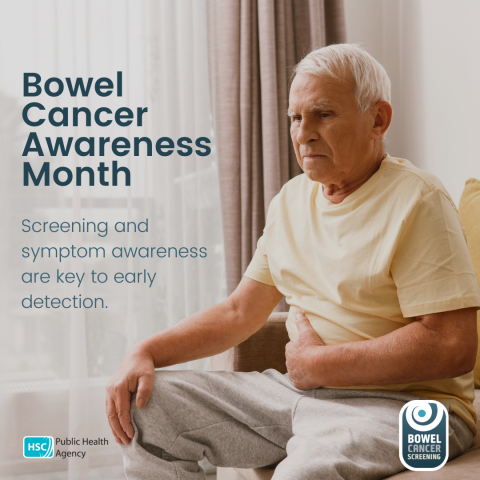1 in 20 people will develop bowel cancer in Northern Ireland

This Bowel Cancer Awareness Month [April], the Public Health Agency (PHA) is reminding people about the two key actions to help combat bowel cancer – act when you notice symptoms, and take part in screening if eligible.
Dr Christine McKee, Public Health Consultant at the PHA, said: “Bowel cancer is one of the most common cancers for both men and women. Being alert to the symptoms of bowel cancer and attending for screening when invited could save your life. The earlier cancer is detected, the better the chances of treatment being successful.”
The bowel cancer screening programme in Northern Ireland is aimed at people who are not experiencing any symptoms that may be linked to bowel cancer.
Bowel cancer screening is offered to people aged 60 to 74 to check for blood in the bowel motion. Screening can help detect cancer at an early stage when treatment is more effective. Screening can also check for and remove polyps, which are abnormal growths in the bowel that can go on to develop into cancer over time.
Dr McKee added: “Bowel cancer is more common in older people, so screening in this age group can save lives by picking up if a person may have bowel cancer early, even when there aren’t any symptoms. We would urge all those who receive a screening test kit to read the information that comes with it, and consider completing and returning the kit.
“The screening test looks for tiny amounts of blood within a small sample of a bowel motion, which would usually not be visible to people. If this is identified through the screening test, further tests are recommended to investigate this. The screening test does not tell you if you have bowel cancer, but can help identify people who don’t have any symptoms and may need further tests.
“It’s also important to be aware of the signs and symptoms of bowel cancer, no matter what age you are. If you receive a screening test and are experiencing any symptoms that may be linked to the bowel, please contact your GP before completing the screening test, as they can offer you a different test for people with bowel symptoms.”
Possible symptoms of bowel cancer can include:
- blood in your poo;
- looser poo, pooing more often and/or constipation;
- a pain or lump in your tummy;
- feeling more tired than usual for some time;
- losing weight for no obvious reason.
Dr McKee concluded: “The symptoms of bowel cancer can be subtle and don’t necessarily make you feel ill. It is important to remember that there are many causes for these symptoms, and most people experiencing these symptoms do not have bowel cancer. If you are experiencing any of these symptoms for three weeks or longer, please contact your GP. It may turn out to be nothing of concern, but if it is something more serious, detecting it as early as possible can give any treatment you may need the best chance of success.”
For more information about bowel cancer signs and symptoms visit www.BeCancerAwareNI.info
For more information about bowel cancer screening visit www.nidirect.gov.uk/articles/bowel-cancer-screening
